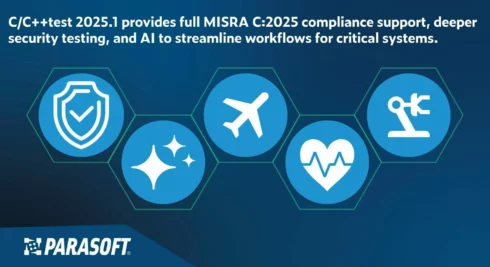
Parasoft released the latest version of its testing solution for C and C++ code, Parasoft C/C++test 2025.1.
According to Parasoft, this latest update includes new capabilities that are designed to meet the strict requirements of applications in heavily regulated industries. It now supports MISRA C:2025, which are guidelines for using C in critical systems; has nearly 70 new static analysis rules for CWEs; and includes an AI assistant that helps access information in Parasoft’s documentation.
The company also revealed that it is working with Google to bring GoogleTest Certification to a future release of Parasoft C/C++test CT. This will close the gap between open-source testing frameworks and certification requirements, lowering the barrier to entry for developing safety-critical applications.
“With C/C++test 2025.1, we are taking a major step forward in helping customers navigate the ever-increasing demands of safety, security, and modern software development practices,” said Igor Kirilenko, chief product officer of Parasoft.
Secure Code Warrior introduces AI Security Rules
This new ruleset will provide developers with guidance for using AI coding assistants securely. It enables them to establish guardrails that discourage the AI from risky patterns, such as unsafe eval usage, insecure authentication flows, or failure to use parameterized queries.
They can be adapted to use with a variety of coding assistants, including GitHub Copilot, Cline, Roo, Cursor, Aider, and Windsurf.
The rules can be used as-is or adapted to a company’s tech stack or workflow so that AI-generated output better aligns across projects and contributors.
“These guardrails add a meaningful layer of defense, especially when developers are moving fast, multitasking, or find themselves trusting AI tools a little too much,” said Pieter Danhieux, co-founder and CEO of Secure Code Warrior. “We’ve kept our rules clear, concise and strictly focused on security practices that work across a wide range of environments, intentionally avoiding language or framework-specific guidance. Our vision is a future where security is seamlessly integrated into the developer workflow, regardless of how code is written. This is just the beginning.”
SingleStore adds new capabilities for deploying AI
The company has improved the overall data integration experience by allowing customers to use SingleStore Flow within Helios to move data from Snowflake, Postgres, SQL Server, Oracle, and MySQL to SingleStore.
It also improved the integration with Apache Iceberg by adding a speed layer on top of Iceberg to improve data exchange speeds.
Other new features include the ability for Aura Container Service to host Cloud Functions and Inference APIs, integration with GitHub, Notebooks scheduling and versioning, an updated billing forecasting UI, and easier pipeline monitoring and sequences.






